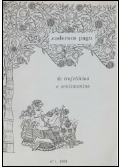Resumo
Abstract
Gender and Women - equivalent or substitutable term? With this question, this text examines two theoretical tendencies - Joan Scott and Marily Strathern - some anthropological contributions and a literary parallel, to suggest lhe disjunctions and conjunctions betweenn “gender” and “women”. The mediation proposed is that gender - which maps a specific field of differences - and women - a substantive category, formulated by gender differences - are neither in opposition nor substitutable.
Referências
Beauvoir, S.: Le deuxième sexe, Gallimard, Paris, 1949
Douglas, M.: Pureza e perigo, Perspectiva, SP, 1966.
Durkheim, E. e Mauss, M.: “de quelques formes primitives de classification”, Mauss, M.: Oeuvres, vol. 11, Minuit, Paris.
Heilborn, M.L.: “Notas sobre a antropologia da mulher”, mimeo.
Héritier, F.: L'Exercice de Ia parenté, Gallimard, Le Seiul, Paris, 1981.
Lévi-Strauss, C.: Tristes trópicos, Ed. Universitário de Buenos Aires, BA, 1970, p. 236.
Malinowski, B.: Argonautas do Pacífico Ocidental, Coleção Os Pensadores, XLIII, Abril Cultural, SP.
Mead, M.: Macho e fêmea, Vozes, RJ, 1971; Sexo e temperamento, Perspectiva, SP, 1969
Sahlins, M.: Cultura e razão prática, Zahar, RJ, 1979.
Scott, J. W., Gender and the politics of history, Columbia University Press, New York, 1988.
Strathern, M.: The gender of the gift, University of California Press, Berkeley, Los Angeles, Landon, 1988.
Turner, V.: Dramas, fields and metaphors: symbolist action in human society, Cornell University Press, Ithaca and Loodon; Sehism and continuity in an African Society, Manchester University Press, Manchester; O processo ritual, Vozes, Petrópolis, 1974.

